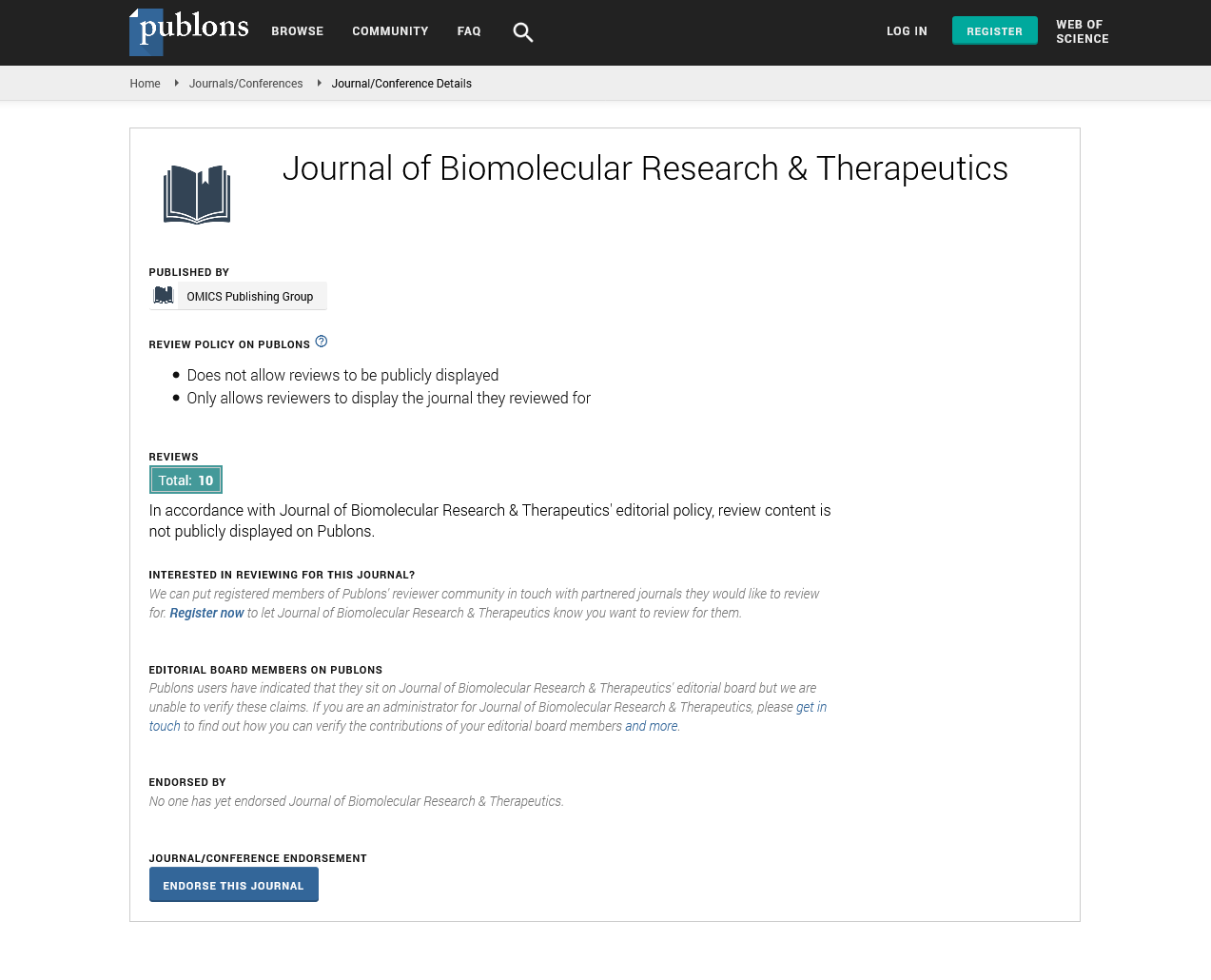Indexed In
- Open J Gate
- Genamics JournalSeek
- ResearchBible
- Electronic Journals Library
- RefSeek
- Hamdard University
- EBSCO A-Z
- OCLC- WorldCat
- SWB online catalog
- Virtual Library of Biology (vifabio)
- Publons
- Euro Pub
- Google Scholar
Useful Links
Share This Page
Journal Flyer

Open Access Journals
- Agri and Aquaculture
- Biochemistry
- Bioinformatics & Systems Biology
- Business & Management
- Chemistry
- Clinical Sciences
- Engineering
- Food & Nutrition
- General Science
- Genetics & Molecular Biology
- Immunology & Microbiology
- Medical Sciences
- Neuroscience & Psychology
- Nursing & Health Care
- Pharmaceutical Sciences
Opinion Article - (2023) Volume 12, Issue 9
Advancing Science and Technology through Biomolecular Engineering
Jiro Doi*Received: 04-Sep-2023, Manuscript No. BOM-23-23599; Editor assigned: 07-Sep-2023, Pre QC No. BOM-23-23599 (PQ); Reviewed: 21-Sep-2023, QC No. BOM-23-23599; Revised: 28-Sep-2023, Manuscript No. BOM-23-23599 (R); Published: 05-Oct-2023, DOI: 10.35248/2167-7956.23.12.332
Description
Biomolecular engineering is a multidisciplinary field that sits at the intersection of biology and engineering, offering innovative solutions to address complex challenges in various sectors, including healthcare, agriculture, environmental science, and beyond. This emerging field leverages the principles and tools of engineering to design, creative, and optimize biological systems at the molecular and cellular levels. In this comprehensive exploration, we will delve into the intricacies of biomolecular engineering, its history, applications, and its potential to shape the future of science and technology.
Applications of biomolecular engineering
Similarly, the development of recombinant DNA technology has given the way for the creation of biologics, which are complex molecules used to treat various diseases, including cancer and autoimmune disorders.
Biopharmaceuticals: One of the most notable applications of biomolecular engineering is in the field of biopharmaceuticals. Through genetic engineering, scientists can produce therapeutic proteins, monoclonal antibodies, and vaccines with precision. Insulin, for instance, is now produced through engineered bacteria, which has revolutionized the treatment of diabetes.
Tissue engineering and regenerative medicine: Biomolecular engineering plays a potential role in tissue engineering and regenerative medicine. Scientists are developing methods to create artificial organs and tissues for transplantation. This involves designing scaffolds for cell growth, optimizing growth factors, and controlling the microenvironment to encourage tissue regeneration. The potential of biomolecular engineering in this domain could reduce the need for organ transplants and enhance the quality of life for patients suffering from organ failure.
Agriculture and food production: Biomolecular engineering has a significant impact on agriculture and food production. Genetically Modified (GM) crops, engineered to resist pests and improve nutritional content, have become an essential part of modern agriculture. Furthermore, this field offers solutions for sustainable agriculture by developing drought-resistant crops and reducing the use of chemical pesticides.
Environmental engineering: Environmental applications of biomolecular engineering include bioremediation and wastewater treatment. Engineered microorganisms are used to degrade pollutants and toxins in contaminated environments. Bioremediation offers a more environmentally friendly and costeffective approach to cleaning up hazardous sites. Additionally, biomolecular engineering is involved in the development of biofuels, which have the potential to replace fossil fuels and reduce carbon emissions.
Synthetic biology: A subfield of biomolecular engineering, focuses on designing and constructing biological parts and systems for new purposes. This includes engineering bacteria to produce biofuels, creating biosensors for environmental monitoring, and designing Genetically Modified Organisms (GMOs) for industrial applications. Synthetic biology Clenches the ability of producing bio-based materials, chemicals, and pharmaceuticals in a sustainable and efficient manner.
CRISPR-Cas9 technology : The CRISPR-Cas9 gene-editing system has transformed genetic engineering and molecular biology. As this technology continues to develop, it will play a pivotal role in disease treatment, genetic modification, and more.
Biological computing: Biomolecular engineering is converging with the field of biological computing, where DNA and other biological molecules are used as information carriers and processors. This opens up possibilities for ultra-efficient data storage, cryptography, and even biological computers.
Biosecurity: As the capabilities of biomolecular engineering expand, the need for robust biosecurity measures will also increase. Safeguarding against the misuse of biotechnology and potential biohazards will become a significant focus.
Conclusion
Biomolecular engineering is a dynamic and interdisciplinary field that continues to advance and transform various industries. It associations the fissure between biology and engineering, providing innovative solutions to address some of the most pressing challenges in healthcare, agriculture, the environment, and beyond. With ongoing breakthroughs in genomics, gene editing, and synthetic biology, the future of biomolecular engineering gives and will likely lead to greatest developments in science and technology. As the field grows, it is imperative to address ethical, regulatory, and safety concerns. Striking a balance between innovation and responsible use of biomolecular engineering techniques is essential to harness the full potential of this exciting field while ensuring that it benefits humanity and the planet. In the years to come, biomolecular engineering is poised to reshape the way we think about biology, engineering, and their convergence in the pursuit of a better, healthier, and more sustainable world.
Citation: Doi J (2023) Advancing Science and Technology through Biomolecular Engineering. J Biol Res Ther. 12:332.
Copyright: © 2023 Doi J. This is an open access article distributed under the terms of the Creative Commons Attribution License, which permits unrestricted use, distribution, and reproduction in any medium, provided the original author and source are credited.

